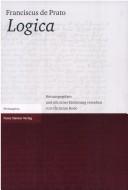| Listing 1 - 10 of 14 | << page >> |
Sort by
|
Book
ISBN: 9783402102909 3402102900 Year: 2015 Volume: 79 Publisher: Münster Aschendorff
Abstract | Keywords | Export | Availability | Bookmark
 Loading...
Loading...Choose an application
- Reference Manager
- EndNote
- RefWorks (Direct export to RefWorks)
Book
ISBN: 9789004308336 Year: 2016 Volume: 65 Publisher: Leiden Brill
Abstract | Keywords | Export | Availability | Bookmark
 Loading...
Loading...Choose an application
- Reference Manager
- EndNote
- RefWorks (Direct export to RefWorks)
Book
ISBN: 9004309837 9789004309838 9789004308336 9004308334 Year: 2016 Publisher: Boston : Brill,
Abstract | Keywords | Export | Availability | Bookmark
 Loading...
Loading...Choose an application
- Reference Manager
- EndNote
- RefWorks (Direct export to RefWorks)
This volume collects twelve chapters that present the multifaceted responses to the works of the William of Ockham in Oxford, Paris, Italy, and at the papal court in Avignon in the 14th century, and it assembles contributions on philosophers and theologians who all have criticized Ockham’s works at different points. In individual case studies it gives an exemplary overview over the reactions the Venerable Inceptor has provoked and also serves to better understand Ockham’s thought in its historical context. The topics range from ontology, psychology, theory of cognition, epistemology, and natural science to ethics and political philosophy. This volume demonstrates that the reactions to Ockham’s philosophy and theology were manifold, but one particular kind of reception is missing: unanimous approval. Contributors include Fabrizio Amerini, Stephen F. Brown, Nathaniel Bulthuis, Stefano Caroti, Laurent Cesalli, Alessandro D. Conti, Thomas Dewender, Isabel Iribarren, Isabelle Mandrella, Aurélien Robert, Christian Rode, and Sonja Schierbaum
Philosophy, Medieval. --- Medieval philosophy --- Scholasticism --- William, --- Guglielmo, --- Guilelmus, --- Guilhelmus, --- Guillaume, --- Guillelmus, --- Guillermo, --- Occam, --- Occam, Guillaume d', --- Occam, William, --- Occamus, Guilielmus, --- Occhamus, Gulielmus, --- Ockam, Guilhelmus de, --- Ockham, William, --- Okkam, Uilʹi︠a︡m, --- Okkʻam, William, --- Wilhelm, --- William Okkʻam,

ISBN: 3515085084 Year: 2005 Publisher: Stuttgart Steiner
Abstract | Keywords | Export | Availability | Bookmark
 Loading...
Loading...Choose an application
- Reference Manager
- EndNote
- RefWorks (Direct export to RefWorks)
Philosophy, Medieval --- Francesco, --- Hervaeus Natalis, --- William,
Book
ISBN: 9783402103524 3402103524 9783402103531 Year: 2022 Publisher: Münster Aschendorff Verlag
Abstract | Keywords | Export | Availability | Bookmark
 Loading...
Loading...Choose an application
- Reference Manager
- EndNote
- RefWorks (Direct export to RefWorks)
"Die Welt der Naturwissenschaften kennt nur materielle Gegenstände, Bäume, Häuser, Organismen, die alle aus Materieteilchen zusammengesetzt sind. Aber erschöpft sich das Inventar unserer Welt in physischen Einzeldingen und deren Eigenschaften? Gibt es nicht auch Geld, Kunstwerke, Gesetze und die Eigenschaften, Bundespräsident oder Briefträger zu sein? Sind diese Gegenstände und Eigenschaften Dinge oder Entitäten sui generis oder lassen sie sich auf naturwissenschaftlich beschreibbare Objekte, auf Atome, Quarks, Elektronen o.ä. zurückführen? Die analytische Philosophie hat in den letzten zwei bis drei Jahrzehnten das Thema der Ontologie des Sozialen wieder in den Fokus der vorrangig angelsächsischen Diskussion gestellt. Jedoch zeigt ein Blick auf das Mittelalter, dass bereits im 13. und 14. Jahrhundert eine Menge an Texten verfasst wurde, die sich auf verschiedene Weisen mit diesem Thema beschäftigten. Auf welche Weise haben mittelalterliche Autoren das Sein von sozialen Gegenständen, von Gesellschaften und von Institutionen konzipiert? Diese Hauptfrage soll anhand ausgewählter mittelalterlicher Texte (ca. 1260 bis ca. 1350) beantwortet werden. Dabei geht es auch um die Fragen nach der Natürlichkeit der menschlichen Gesellschaft und nach dem Verhältnis des Individuums und dessen Natur zum Ganzen der politischen Gemeinschaft."--
Philosophy, Medieval --- Ontology --- Culture --- Material culture --- Social sciences --- Civilization, Medieval --- History --- Philosophy
Book
Year: 1984 Publisher: Liège : Université de Liège, Faculté des sciences appliquées (ULg),
Abstract | Keywords | Export | Availability | Bookmark
 Loading...
Loading...Choose an application
- Reference Manager
- EndNote
- RefWorks (Direct export to RefWorks)
Book
ISBN: 3031239830 3031239849 Year: 2023 Publisher: Cham Springer International Publishing AG
Abstract | Keywords | Export | Availability | Bookmark
 Loading...
Loading...Choose an application
- Reference Manager
- EndNote
- RefWorks (Direct export to RefWorks)
Multi
ISBN: 9783031239847 9783031239830 9783031239854 9783031239861 Year: 2023 Publisher: Cham Springer International Publishing
Abstract | Keywords | Export | Availability | Bookmark
 Loading...
Loading...Choose an application
- Reference Manager
- EndNote
- RefWorks (Direct export to RefWorks)
This book offers a collection of contributions on medieval, early modern, and contemporary perspectives on social ontology. Since the 1990s, social ontology has emerged as a vibrant research area in contemporary analytical philosophy. Questions concerning the nature and properties of social groups, institutions, facts, and objects like money and marriage, have been thoroughly discussed. However, the historical perspective has been largely neglected. One of the central aims of this volume is to show that relevant views on social ontology can be found in medieval and early modern philosophy (ca. 1200-1700 C.E.), when, for example, the ontological status of money, law, and the sacraments was hotly debated. We see, furthermore, diverging positions between Aristotelian-inspired authors, who resort to a more naturalistic view of the emergence of the social realm, and authors like Olivi and Ockham, who emphasize the role of human free will and contractualist agreements. This book is the very first to address historical and contemporary social ontologies. Both historians of philosophy and philosophers will benefit from this juxtaposition, which fosters a better understanding of historical positions and approaches by using today’s conceptual and analytical tools, and allows the contemporary debate to gain new perspectives by confronting its own medieval and early modern history.
Metaphysics --- World history --- geschiedenis --- sociale geschiedenis --- metafysica --- Analysis (Philosophy)
Book
ISBN: 9789042951129 Year: 2024 Publisher: Leuven Peeters
Abstract | Keywords | Export | Availability | Bookmark
 Loading...
Loading...Choose an application
- Reference Manager
- EndNote
- RefWorks (Direct export to RefWorks)

ISBN: 3515079610 Year: 2002 Publisher: Stuttgart Franz Steiner Verlag
Abstract | Keywords | Export | Availability | Bookmark
 Loading...
Loading...Choose an application
- Reference Manager
- EndNote
- RefWorks (Direct export to RefWorks)
Logic --- Argumentation --- Deduction (Logic) --- Deductive logic --- Dialectic (Logic) --- Logic, Deductive --- Intellect --- Philosophy --- Psychology --- Science --- Reasoning --- Thought and thinking --- Methodology
| Listing 1 - 10 of 14 | << page >> |
Sort by
|

 Search
Search Feedback
Feedback About UniCat
About UniCat  Help
Help News
News